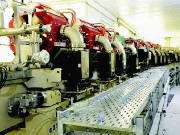Metstrut supplies Diamond synchrotron

Over 6 km of cable tray for the Diamond synchrotron project in Oxfordshire was supplied in
4-tier prefabricated racks by Metstrut.
Over 6 km of bespoke cable tray has been installed in the largest scientific facility to be built in the UK for over 30 years. The Metstrut prefabricated cable tray serves the £250 million Diamond synchrotron on the Harwell/Chilton science campus in Oxfordshire. The trays carry all the complex electrical cabling requirements for each of the 24 experimental research stations and the control rooms, laboratories and offices. This world-class facility will produce very bright X-ray, infra-red and ultra-violet beams for investigating the basic structure of matter. Each Diamond experimental station houses the mirrors, lenses and filters which focus the beams. To carry the cables to these stations, Metstrut has made 24 ‘achromats’, each one a 16 m set of prefabricated, preassembled modules in six units of different lengths 600 mm wide and 740 mm high. Each achromat was delivered as a set of completed racks, with specially designed connection plates set to the curve of the doughnut-shaped building. The bottom tier of tray carries 55 mm-thick dipole cables, the next power cables, the next control cables and the top tier instrument cabling. Metstrut’s sales director Richard Beale says, ‘We believe prefabrication is the way of the future because it optimises installation time. Cutting heavy, 600 mm-thick cable trays into individual lengths and building racks on site isn’t an easy process.’
Related links:


